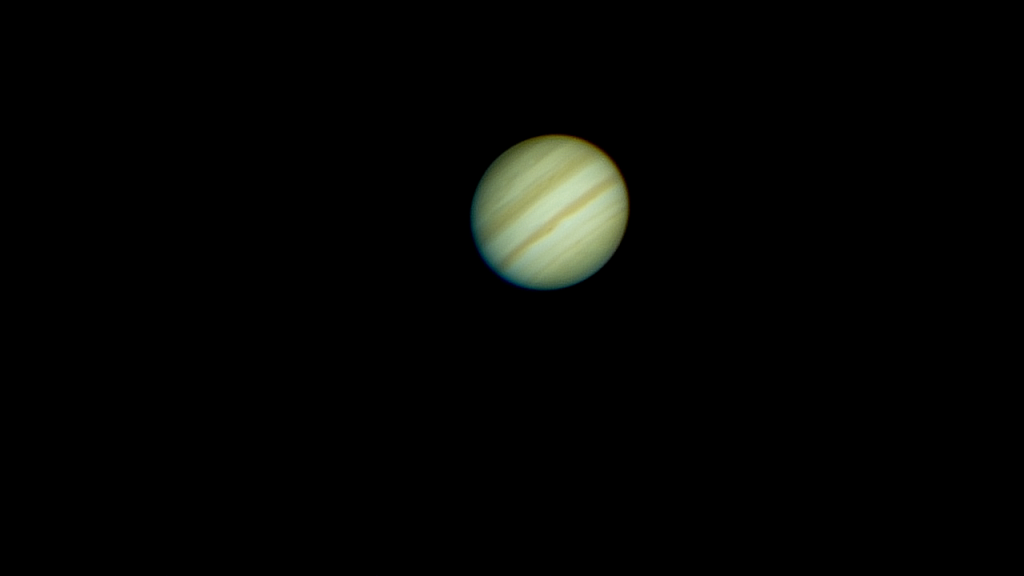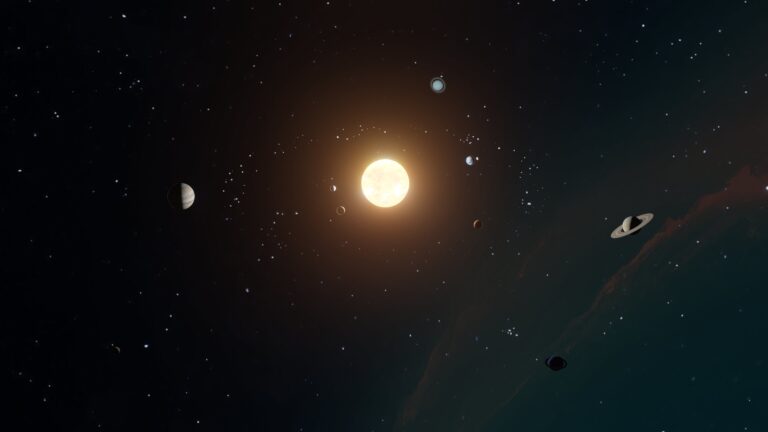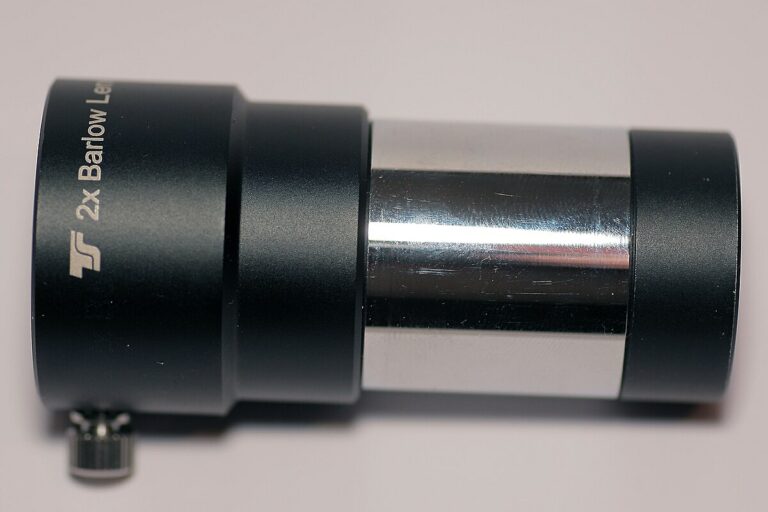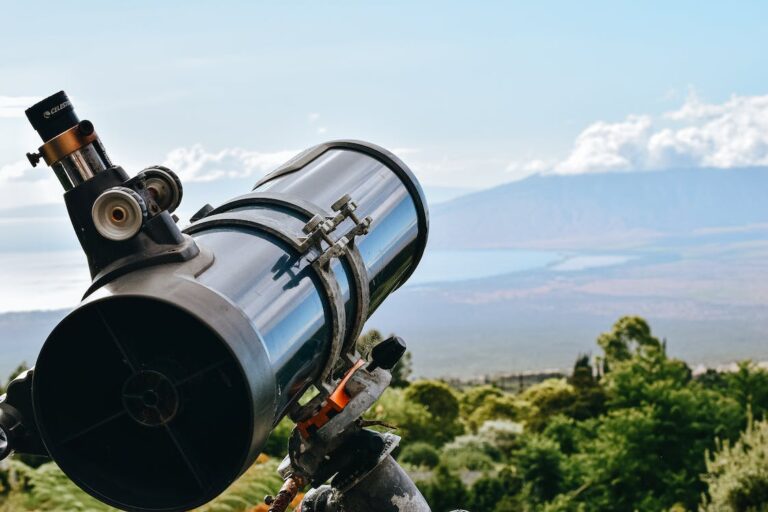Table of Contents
Having the right telescope is crucial for viewing planets, as it determines the quality of the image you see. With so many telescope options on the market, it is difficult to determine what is the best telescope for viewing planets.
With the right telescope, you can see the details and features of the planets, including their moons, rings, and atmospheres. With the wrong telescope, you may only see a blurry or unimpressive image.
In this post, we’ll go over the different types of telescopes, pros and cons, and my selections. At the end I will give my top overall choice for the best telescope for viewing planets.
What Factors to Consider in Determining the Best Telescope for Viewing Planets
When choosing the best telescope for viewing planets, there are several important factors to consider:
- Aperture size: The aperture size of a telescope determines the amount of light that enters the telescope and affects the clarity and brightness of the image. A larger aperture size will result in a clearer and brighter image of the planets.
- Magnification: Magnification determines how much you can zoom in on a planet and see its details. A high magnification allows you to see the details of the planets, but it also requires a stable mount to maintain image quality.
- Stability: A stable mount and tripod are important for keeping the telescope steady and maintaining image quality during planet viewing.
- Type of telescope: There are two main types of telescopes, reflector and refractor, each with its own advantages and disadvantages for planet viewing. Reflector telescopes are usually more affordable, but refractor telescopes are known for their clear images and are often favored by experienced astronomers.
- Budget: Telescopes come in a range of prices, from low-cost beginner models to high-end professional telescopes. It's important to choose a telescope that fits your budget and provides the features you need for planet viewing.
- Portability: If you plan to take your telescope to different locations for observing, it's important to choose a telescope that is lightweight and easy to transport.

Reflector Telescopes
Why Choose a Reflector Telescope
Reflector telescopes, also known as Newtonian telescopes, are telescopes that use mirrors to reflect light and form an image. They are the most affordable type of telescope and are a popular choice for beginner astronomers.
One of the key benefits of reflector telescopes is their large aperture size. This allows them to gather more light, resulting in clearer and brighter images of the planets and other celestial objects.
Overall, reflector telescopes are a great option for beginner astronomers who are looking for a cost-effective way to observe the planets and other celestial objects.
Reflector Telescopes for Viewing Planets - Advantages and Disadvantages
Advantages
Disadvantages
Affordability: Reflector telescopes are the most affordable type of telescope, making them a great option for beginner astronomers who are on a budget.
Large aperture size: Reflector telescopes have a large aperture size, which allows them to gather more light and produce clearer and brighter images of the planets.
Easy to maintain: Reflector telescopes are easy to maintain and repair, as the mirrors can be cleaned and adjusted as needed.
Challenging to set up and align: Reflector telescopes can be more challenging to set up and align than other types of telescopes, which can affect the quality of the image.
Chromatic aberrations: Reflector telescopes may suffer from chromatic aberrations, which result in a rainbow effect around the edges of the image.
Not as durable: Reflector telescopes are not as durable as refractor telescopes, as the mirrors are more prone to damage and need to be cleaned more often.
Overall, reflector telescopes are a good option for beginner astronomers who are looking for a cost-effective way to observe the planets and other celestial objects, but they may not provide the same clarity and durability as refractor telescopes.
My Picks for Best Reflector Telescopes for Planet Viewing
Best Low-Budget Reflector Telescope
The Orion SpaceProbe 130ST reflector telescope is a great choice for serious beginners and intermediate stargazers. It features a 130mm parabolic primary mirror and comes with an EQ-2 equatorial mount with dual setting circles and slow-motion controls. This allows for easy tracking of celestial objects after a simple polar alignment. The telescope is compact, weighing only 27 pounds once assembled, and is highly portable. It’s an excellent option for those seeking a high-quality first telescope or a portable addition to their stargazing equipment.
| Optical design | Reflector |
|---|---|
| Optical diameter | 130mm |
| Focal length | 650mm |
| Focal ratio | f/5.0 |
| Eyepieces | Plossl 25.0mm,10.0mm (1.25″) |
| Magnification with included eyepieces | 26x, 65x |
| Lowest useful magnification | 19x |
| Highest useful magnification | 260x |
| User level | Beginner |
| Best for viewing | Brighter deep sky |
Reasonable Aperture: The 130mm primary mirror provides decent light-gathering capability for planet viewing, allowing you to see details on planets like Jupiter and Saturn.
Equatorial Mount: The EQ-2 equatorial mount makes it easier to track planets as they move across the night sky, ensuring a stable view.
Sturdy Tripod: The adjustable-height aluminum tripod is strong and stable, providing a reliable platform for planet observation.
Portability: Weighing only 27 pounds once assembled, it’s relatively lightweight and portable, making it suitable for taking to various stargazing locations.
Limited Aperture: While the 130mm aperture is reasonable, it may not provide the level of detail and brightness that larger telescopes can offer for planet viewing.
Entry-Level Optics: It’s designed for beginners and intermediates, so experienced astronomers might find it lacking in advanced features and optics..
Limited Accessories: The included eyepieces and accessories may not be of the highest quality, and you may need to invest in additional eyepieces for better planetary observations.
Best Mid-Budget Reflector Telescope
The SkyQuest XT6 Classic Dobsonian telescope offers impressive value with its jumbo-sized optics and straightforward design, earning rave reviews from Astronomy magazine. It’s an affordable choice, providing deep-space observation without breaking the bank. This telescope is well-equipped for both beginners and more experienced stargazers, featuring a high-quality parabolic mirror, a stable Dobsonian base, a user-friendly focuser, aiming device, eyepiece, and quick-collimation cap. It’s easy to set up and delivers fantastic views of celestial objects, making it a budget-friendly supernova of telescope value.
| Best for viewing | Brighter deep sky |
| User level | Beginner |
| Optical design | Reflector |
| Optical diameter | 150mm |
| Focal length | 1200mm |
| Focal ratio | f/8.0 |
| Eyepieces | Sirius Plossl 25.0mm (1.25″) |
| Magnification (Included) | 48x |
| Resolving power | 0.77arc*sec |
| Lowest useful magnification | 21x |
| Highest useful magnification | 300x |
| Limiting stellar magnitude | 13.5 |
| Mount type | Dobsonian |
| Weight, fully assembled | 34.4 lbs. |
Affordable Entry-Level Option: The XT6 offers a cost-effective way for beginners to delve into astronomy with a reliable Dobsonian telescope.
Large Aperture: With a 150mm (6-inch) aperture, it gathers ample light for impressive views of the Moon, planets, and various deep-sky objects.
Stable Dobsonian Mount: The Dobsonian base provides stability and ease of use, allowing for smooth point-and-view navigation.
Quality Optics: The telescope features a well-figured parabolic mirror for clear and detailed observations.
Quick Setup: Assembly is straightforward and quick, making it accessible for those new to astronomy.
Limited Portability: While it’s not overly large or heavy, it may not be as portable as some smaller telescopes, limiting its use for on-the-go stargazing.
Basic Accessories: The included eyepieces and accessories are functional but may not offer the best possible viewing experience, potentially requiring additional investments.
Manual Tracking: The Dobsonian mount is manually operated, which means you’ll need to adjust it to track celestial objects as they move across the sky.
Not for Advanced Astronomers: More experienced astronomers may outgrow this telescope’s capabilities relatively quickly as their skills and expectations advance.
Best High-Budget Reflector Telescope
Sky-Watcher’s Collapsible Dobsonian telescopes offer the best of both worlds: large apertures for excellent viewing and a unique collapsible design for easy storage and transportation. Unlike traditional Dobsonians, these telescopes use a three-strut system that maintains optical alignment without the need for constant collimation. The mirrors are of high quality, providing exceptional contrast and minimal vignetting, while the smooth mount base ensures effortless maneuvering. Additionally, these telescopes come with a 2″ Crayford focuser, 1.25″ adapter, two eyepieces, a finderscope, and an eyepiece tray, making them a comprehensive and convenient choice for amateur astronomers.
Aperture (mm) 305
F/ratio 4.9
Focal Length (mm) 1500
Secondary Diameter (mm) 70
Dawes Limit 0.38
Limiting Magnitude 14.9
Maximum Magnification 600
OTA Weight (lbs) 46.2
Base Weight (lbs) 38.3
Included Eyepieces 10mm & 25mm
Large Aperture: The 12-inch (300mm) aperture provides excellent light-gathering capacity, enabling high-resolution views of celestial objects.
Collapsible Design: The Flextube design allows for easy storage and transportation, making it more convenient than traditional large telescopes.
No Disassembly Required: Unlike some other collapsible designs, this telescope doesn’t need to be disassembled when collapsing, which saves time and effort.
Optical Quality: Sky-Watcher is known for its high-quality optics, and this telescope features mirrors constructed with borosilicate glass for impressive clarity and brightness.
Smooth Movement: The telescope includes Teflon or steel needle bearings, depending on the model, ensuring smooth and easy movement for precise tracking.
Comprehensive Accessories: It comes with a 2″ Crayford focuser, a 1.25″ adapter, two eyepieces (typically 25mm and 10mm), a finderscope, and an eyepiece tray, offering everything you need to start observing.
Size and Weight: Due to its substantial size and weight, this telescope may be less portable and more challenging to transport compared to smaller models, limiting its use to fixed observing locations.
Price: Larger apertures and high-quality optics come at a cost, and this telescope may be relatively expensive for some enthusiasts.
Assembly Time: Despite the collapsible design, assembly and setup can still take more time than smaller and simpler telescopes.
Complexity for Beginners: It may not be the best choice for absolute beginners, as handling a large telescope requires some experience.
Refractor Telescopes
Why Choose a Refractor Telescope
Refractor telescopes are known for their sharp and clear images and are a popular choice among amateur and professional astronomers.
They are available in a variety of sizes and styles, including long and narrow, short and stubby, and portable models. They are typically made of high-quality materials, such as glass or a combination of glass and plastic, that ensure clear and crisp images.
Refractor telescopes are also known for their durability and stability, as they are less affected by environmental factors, such as temperature and moisture, than other types of telescopes.
Refractor telescopes are a good choice for astronomers who want the best image quality and durability, and are willing to pay a premium for these features. They are particularly well suited for viewing the planets.
Refractor Telescopes for Viewing Planets - Advantages and Disadvantages
Advantages
Disadvantages
Clear and sharp images: Refractor telescopes are known for producing clear and sharp images of the planets, with minimal chromatic aberrations or other distortions.
Easy to use: Refractor telescopes are easy to set up and align, making them a convenient choice for observing the planets.
Durable and low maintenance: Refractor telescopes are more durable than reflector telescopes, as their lenses are less prone to damage and do not need to be cleaned as often.
Limited aperture size: Refractor telescopes have a smaller aperture size compared to reflector telescopes, which can limit the amount of light they can gather and the quality of the image.
Can be heavy: Refractor telescopes can be heavy, making them less portable and more challenging to transport to different observing locations.
Overall, a refractor telescope offers exceptional image quality and lasting performance. Their various styles and sizes offer versatility and ease of setup. Crafted with quality materials, they withstand environmental factors, and their crisp, clear images make them a great choice for exploring planets.
My Picks for Best Refractor Telescopes for Viewing Planets
Best Low-Budget Refractor Telescope
AstroMaster 70AZ Telescope
The Celestron AstroMaster is a professionally designed, durable, and versatile dual-purpose telescope. It’s user-friendly and comes with two eyepieces, a red dot finder scope, and an adjustable-height tripod. With its 70mm aperture optics, it provides clear views of celestial objects like Saturn, Jupiter, the Moon, galaxies, and nebulae, while also being suitable for daytime use. The telescope is easy to set up, and the package includes astronomy software for sky simulation and a deluxe accessory tray. Founded in 1960, Celestron is a trusted brand known for its quality telescopes used by scientists and enthusiasts worldwide.
Aperture 70mm (2.76”)
Focal Length 900mm (35”)
Focal Ratio f/13
Magnification 45x, 90x
Limiting Magnitude 11.7
Low Useful Magnification 10x
High Theoretical Magnification 165x
Assembled Weight 11.0 lbs (5.0 kg)
User-Friendly: It’s an excellent choice for beginners due to its straightforward setup and operation.
Fully-Coated Optics: The fully-coated glass optics enhance image clarity and brightness, allowing for detailed views of celestial objects.
Magnification Options: The included 20mm and 10mm eyepieces offer 45x and 90x magnification, respectively, for various observing needs.
Compact and Lightweight: The lightweight frame and portable design make it easy to transport to different observing locations.
Astronomy Software: Included astronomy software, Starry Night Basic Edition, provides interactive sky simulations and educational resources.
Limited Aperture: The 70mm aperture may limit the level of detail visible on faint deep-sky objects compared to telescopes with larger apertures.
Basic Finder Scope: The red dot finder scope is functional but might not be as precise as more advanced finder systems.
Entry-Level Optics: While suitable for beginners, more experienced astronomers may outgrow the capabilities of this telescope over time.
Best Mid-Budget Refractor Telescope
The Koolpte refractor telescope boasts a 90mm aperture and 900mm focal length for exceptional optical performance, enabling deep space observations. It includes a digital eyepiece for capturing and sharing astronomical images. The sturdy Vertisteel Altazimuth Mount ensures stability, while a phone adapter and wireless remote facilitate image sharing. Suitable for both beginners and professionals, it offers a user-friendly design and top-notch optics for planetary viewing.
| Aperture | 90 Millimeters |
| Telescope Mount Description | Altazimuth Mount |
| Product Dimensions | 16.7″D x 39.7″W x 8.7″H |
| Focus Type | Manual Focus |
| Finderscope | Reflex |
| Compatible Devices | Smartphone |
| Focal Length Description | 900 millimeters |
Powerful Optics: The 90mm aperture and 900mm focal length provide impressive optical performance, allowing for clear and detailed observations of celestial objects.
Digital Eyepiece: The inclusion of a digital eyepiece enables you to capture and share images and videos of your astronomical observations, enhancing the overall viewing experience.
Sturdy Mount: The Vertisteel Altazimuth Mount offers stable support and smooth, high-precision movement for the telescope, ensuring accurate positioning during observations.
Phone Adapter and Wireless Remote: The addition of a phone adapter and wireless remote makes it convenient to capture and share images without physically touching the telescope, maintaining a steady and stable observation experience.
User-Friendly: Designed to be suitable for both beginners and professionals, this telescope is user-friendly and can serve as an excellent tool for learning and researching astronomy.
Digital Eyepiece Limitations: While the digital eyepiece is a valuable feature, it may not match the capabilities of dedicated astronomy cameras, limiting its use for advanced astrophotography.
Limited Aperture for Deep Space: While the telescope’s aperture is decent, it might not provide the level of detail and brightness that larger telescopes with larger apertures can offer for deep space observations.
Compact Design: While the compact design can be an advantage for portability, it might result in some limitations in terms of light-gathering ability and field of view.
Brand Reputation: Depending on the brand and its reputation, the quality and durability of the telescope may vary. It’s essential to research the specific product’s build and customer reviews for reliability.
Best High-Budget Refractor Telescope
Sky-Watcher’s EvoStar series offers astronomers superior extra-low dispersion glass with apochromatic doublets for exceptional visual and photographic performance. Their Metallic High-Transmission Coatings (MHTC) reduce color fringing, providing sharp images even for bright planetary objects. The refractors are optimized for astrophotography and weight-saving, making them compatible with more affordable mounts. They come with a dual-speed Crayford-style focuser, accessories, and a transport case, offering a convenient and cost-effective solution for both visual and photographic astronomy.
Focal length 900 mm
F-ratio 9
Eyepieces 5 mm and 20 mm 1.25 inch
Highest useful magnification 236x
Lowest useful magnification 14x
Limiting stellar magnitude 12.5
Resolution (Rayleigh) 1.39 arc seconds
Resolution (Dawes) 1.16 arc seconds
Light-gathering power 204x
Mount type V-style dovetail
Tube length (inches) 36.2
Outer diameter (inches) 4.5625
Tube weight (pounds) 8.4
Expertly Matched Glass: The use of a matched doublet objective with synthetic fluorite element ensures excellent color correction for both visual and photographic purposes.
Outstanding Color Correction: The combination of high-quality glass and proprietary Metallic High-Transmission Coatings (MHTC) results in sharp images with accurate colors and minimal aberrations.
Versatile: This telescope can evolve with your skills, making it suitable for both beginners and seasoned astrophotographers, serving as a primary optical tube that adapts to your expertise.
Dual-Speed Focuser: The 10:1 dual-speed Crayford-style focuser simplifies the process of achieving precise focus, accommodating various eyepieces and cameras.
Complete Package: The EvoStar 100 comes with a comprehensive set of accessories, including a foam-lined aluminum hard case, 8×50 Right Angle Correct Image Finderscope (RACI), 2″ Dielectric Diagonal, LET Eyepieces, Adapter, Mounting Rings, and a V-Style Dovetail for a convenient and ready-to-use setup.
Weight and Portability: Refractor telescopes can be relatively heavy, which may affect portability and require a sturdy mount for stable observations. The provided information does not specify the weight or size of this particular model.
Astrophotography Learning Curve: While versatile, achieving optimal results in astrophotography may require a learning curve and additional equipment, such as a tracking mount.
Computerized Telescopes
Why Choose a Computerized Telescope
Computerized telescopes are telescopes that use advanced technology, such as computerized mounts and digital setting circles, to make finding and tracking celestial objects easier.
They typically come with software that allows you to input the object you want to view and the telescope will automatically move to that location. Computerized telescopes often have databases of thousands of celestial objects, making it easy to explore the night sky.
Computerized telescopes can be either reflector or refractor telescopes and come in a range of sizes and styles to suit different needs and preferences.
These telescopes are a great option for anyone who wants to enjoy the night sky with ease and convenience and I consider them the best telescope for viewing planets.
Computerized Telescopes for Viewing Planets - Advantages and Disadvantages
Advantages
Disadvantages
Ease of use: One of the biggest advantages of computerized telescopes is their ease of use. With a computerized mount, finding and tracking celestial objects is much faster and easier than with a traditional telescope.
Accurate and fast object locating: Computerized telescopes use digital setting circles and computerized mounts to accurately locate celestial objects. This makes it much easier to find and view planets and other celestial objects.
Large object database: Many computerized telescopes come with databases of thousands of celestial objects, making it easy to explore the night sky and learn about the universe.
Convenient for beginners: Computerized telescopes are ideal for beginners, as they are user-friendly and require less knowledge of astronomy to use effectively.
Cost: Computerized telescopes can be more expensive than traditional telescopes, making them less accessible to those on a tight budget.
Dependence on technology: Computerized telescopes rely on technology and electronics to function, which can be less reliable than traditional mechanical telescopes. If the technology fails, the telescope may not be able to be used.
Limited manual control: While computerized telescopes make it easier to find celestial objects, they often offer limited manual control. This means that experienced astronomers may prefer a traditional telescope for greater control and customization.
Overall, computerized telescopes offer a convenient and efficient way to view the planets and other celestial objects. While they have some disadvantages, they are a great option for beginners and those who value ease of use and accuracy in their astronomical observations.
My Picks for Best Computerized Telescopes for Viewing Planets
Best Low-Budget Computerized Telescope
The Celestron 114LCM Computerized Newtonian Telescope offers automatic celestial object location with its computerized GoTo mount, capable of pinpointing 4,000 objects. Its Sky Tour button simplifies selection by generating a list of the best objects for viewing. The telescope includes a full-height tripod, two quality eyepieces, and a StarPointer finderscope. It also comes with a free download of top-rated Starry Night software for astronomical simulations. Backed by a 2-Year US Warranty and expert support from Celestron, this telescope ensures a user-friendly stargazing experience.
Optical Design Newtonian Reflector
Aperture 114mm (4.49”)
Focal Length 1000mm (39”)
Focal Ratio f/8.77
Magnification 60x, 167x
Limiting Magnitude 12.8
Lowest Magnification 16x
Highest Magnification 269x
Assembled Weight 13.2 lbs
Computerized GoTo Mount: The telescope is equipped with a computerized GoTo mount that can automatically locate and track over 4,000 celestial objects, making it easier for users to find and observe specific targets.
Sky Tour Function: The Sky Tour button simplifies the process of selecting celestial objects by generating a list of the best objects currently visible in the sky, making it a user-friendly option for beginners.
Free Starry Night Software: It includes a free download of Starry Night software, a valuable tool for simulating the night sky and planning observing sessions, enhancing the overall stargazing experience.
Celestron Brand and Support: Being a well-established brand in the telescope industry since 1960, Celestron offers a 2-Year US Warranty and access to a team of US-based experts for customer support and assistance.
Learning Curve: While the computerized system makes locating objects more accessible, users may still need some time to learn how to use the telescope and its features effectively.
Limitation of Sky Database: While the telescope can locate many celestial objects, its database may not include very faint or highly specialized targets, which could be a drawback for advanced users.
Portability: The telescope’s size and weight may limit its portability, making it less convenient for on-the-go stargazing and travel.
Best Mid-Budget Computerized Telescope
The Celestron NexStar 130SLT builds upon the success of the NexStar 114SLT, offering 30% more light-gathering power with its 130mm primary mirror. This computerized telescope provides access to a database of over 4,000 celestial objects, including stars, galaxies, and nebulae, and offers pinpoint accuracy in locating and tracking them. It’s easy to set up with its pre-assembled, adjustable steel tripod and aligns swiftly using SkyAlign technology. Ideal for both adults and kids, it’s portable for camping trips and dark sky excursions. The telescope includes Starry Night Basic Edition software for interactive sky simulation, making it perfect for lunar, planetary, and deep-sky observation.
Optical Design Newtonian Reflector
Aperture 130mm (5.12”)
Focal Length 650mm (26”)
Focal Ratio f/5
Magnification 26x, 72x
Limiting Magnitude 13.1
Low Useful Magnification 19x
High Theoretical Magnification 307x
Assembled Weight 18 lbs (8.16 kg)
Computerized GoTo Mount: The computerized mount with a database of over 4,000 celestial objects simplifies locating and tracking targets, making it an excellent choice for beginners and those wanting to explore a wide range of objects.
Swift Setup: The telescope comes with a pre-assembled, adjustable steel tripod, enabling quick and easy assembly, making it suitable for portable use during camping trips and dark sky excursions.
SkyAlign Technology: The SkyAlign alignment technology simplifies the alignment process by centering bright objects in the eyepiece, making it more user-friendly for those new to telescopes.
Versatile Observation: With its increased light-gathering capabilities, the telescope allows for detailed observations of celestial objects, including the lunar surface, Saturn’s rings, Mars’ polar ice caps, Jupiter’s cloud belts, and various Messier objects.
Compact and Portable: Its compact form factor and ease of setup make it convenient for transport and assembly in various locations.
Cost: Computerized telescopes with GoTo functionality are typically more expensive than manual telescopes, which may not suit all budgets.
Power Source: The telescope requires a battery power source, which could be a limitation in remote areas if you don’t have an extra supply.
Complexity for Beginners: While user-friendly, the computerized features may have a learning curve for complete beginners in astronomy and telescope use.
Best High-Budget Computerized Telescope
Celestron’s NexStar 8SE Schmidt-Cassegrain Telescope is a top choice for both beginners and experienced observers seeking a telescope that blends the latest computer technology with advanced optics. This iconic “orange tube” design offers striking views of our Solar System, from Saturn’s rings to lunar features, as well as deep-sky objects like the Hercules Globular Cluster and Whirlpool Galaxy. With a vast database of 40,000+ celestial objects, the GoTo mount automates locating and tracking. Its easy assembly and SkyAlign technology make setup a breeze. As your astronomical skills grow, you can enhance it further with high-tech accessories, such as SkySync and StarSense AutoAlign, ensuring this telescope evolves with you in the pursuit of stargazing.
Optical Design Schmidt-Cassegrain
Aperture 203.2 mm (8”)
Focal Length 2032 mm (80”)
Focal Ratio f/10
Magnification 81x
Limiting Magnitude 14
Low Useful Magnification 29x
High Theoretical Magnification 480x
Assembled Weight 33 lbs
Excellent Optics: The telescope’s high-performance Starbright XLT coatings enhance the legendary quality of Celestron’s C8 optics, allowing for impressive views of celestial objects, including Saturn’s Cassini Division, Jupiter’s Great Red Spot, Martian features, and globular clusters.
Easy Computerized GoTo Tracking: The NexStar 8 SE features a computerized “GoTo” mount with Celestron’s “SkyAlign” technology, making it user-friendly for quick and accurate alignment. This simplifies the process of locating and tracking celestial objects.
Light and Portable: Weighing only 24 pounds, this telescope is relatively lightweight and portable for an eight-inch telescope, making it suitable for on-the-go stargazing, and it offers a good balance between performance and affordability.
Plastic Accessories: Some of the included accessories, such as the red-dot finder scope, are made of plastic, which may not be as durable as metal alternatives. Upgrading accessories may be desirable for a more robust experience.
Short Battery Life: If using batteries to power the telescope, it may have a relatively short battery life. An external power source or additional batteries may be necessary for extended stargazing sessions.
Too Light for Astro-Photography: While the telescope is portable, its lightweight nature may not be ideal for astrophotography, which typically requires a more stable and heavier mount to capture long-exposure images without blurring.
Top Overall Pick
The Celestron NexStar 130SLT is a winning combination of advanced features and user-friendliness. This computerized telescope offers remarkable light-gathering power with its 130mm primary mirror, making it versatile for observing a wide range of celestial objects. With a database of over 40,000 celestial targets and SkyAlign technology, it simplifies the process of locating and tracking objects, even for beginners. Its quick setup and compact design ensure portability for on-the-go stargazing. Plus, it’s expandable with high-tech accessories for those looking to delve deeper into astronomy. Overall, the NexStar 130SLT strikes an impressive balance between performance, ease of use, and affordability, making it the ideal choice for the best telescope for viewing planets.
Choosing the best telescope for viewing planets is important for getting the best viewing experience possible. When making a decision, it is important to consider your budget, experience level, and specific needs and preferences. Whether you choose a reflector, refractor, or computerized telescope, there is a perfect option for everyone. With the right telescope, you can observe the beauty and complexity of the planets in our solar system, and explore the wonders of the night sky like never before.

Andrew
With years of experience and a passion for exploring the cosmos, I want to be your go-to destination for all things celestial. My mission is to bring the wonders of the universe to your fingertips and demonstrate how the art of stargazing and telescope therapy can nurture not only your astronomical curiosity but also your mental health. Explore the cosmos with me and discover the profound connection between the night sky and your inner peace.
We may earn commissions through affiliate links in this post. This means we may receive a small commission if you make a purchase through these links. This comes at no extra cost to you and helps support our site’s content. We only recommend products or services we believe will add value to our readers. Your support is appreciated!









+ There are no comments
Add yours